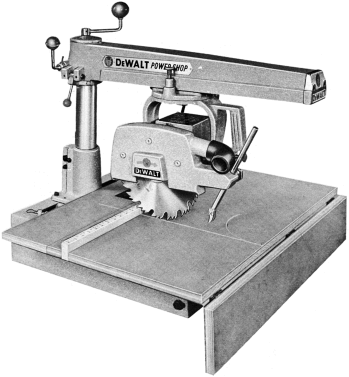BruceRPA
Addicted Member
I would like to have a decent portable bench-top power saw. I think a jig saw/ sabre saw or even a small band saw might do the trick. Maybe a small power miter saw could work too. I don't think I want a small table saw. It will be used primarily for small projects around the house and shop to cut lightweight materials like 1/2" or 3/4" plywood, PVC pipe, thin sheet metal, and similar materials. It would be nice if I could cut an occasional 2X4, but that is not essential. I have had a Shopsmith multipurpose machine for many years. I do hope to get it out of storage again and make some space for it so that I can return it to use. If there was a scaled-down bench-top version of that thing, it would be perfect. I am primarily interested in quick, easy and convenient access and use for this new machine.
I found a Rockwell BladeRunner and did some research online. See the attached picture. The older model (not the "X2" version) was supposed to be more robust and accurate. It also has variable speed. I found one on clearance at our local Lowe's so I bought it last night. I tried cutting some scrap 1/2" X 2" furring strips. What a disappointment! Even after trying to adjust the thing I could only get every third cut to come close to 90 degrees. Trying to make a 45 degree cut was ridiculous! The blade wandered so much that both the vertical cut and the 45 degree cut were off A LOT! I will work with it again this evening for a while but I think it is going back to Lowe's.
So, if you know of, or better yet have a tool that may work for me, I sure would appreciate knowing about it. I have not been able to find anything online so far.
Thanks!
I found a Rockwell BladeRunner and did some research online. See the attached picture. The older model (not the "X2" version) was supposed to be more robust and accurate. It also has variable speed. I found one on clearance at our local Lowe's so I bought it last night. I tried cutting some scrap 1/2" X 2" furring strips. What a disappointment! Even after trying to adjust the thing I could only get every third cut to come close to 90 degrees. Trying to make a 45 degree cut was ridiculous! The blade wandered so much that both the vertical cut and the 45 degree cut were off A LOT! I will work with it again this evening for a while but I think it is going back to Lowe's.
So, if you know of, or better yet have a tool that may work for me, I sure would appreciate knowing about it. I have not been able to find anything online so far.
Thanks!
Attachments
Last edited:



